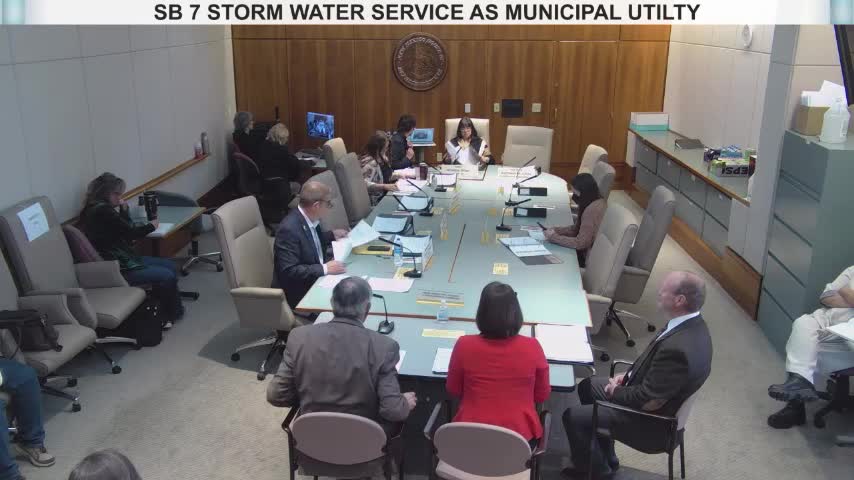Committee hears testimony on bill letting New Mexico municipalities create stormwater utilities
Get AI-powered insights, summaries, and transcripts
Subscribe
Summary
Lawmakers and expert witnesses discussed Senate Bill 7, which would add “stormwater facilities” to the statutory definition of municipal utilities and allow municipalities to establish optional stormwater utilities and charge fees; no committee vote was taken because a quorum was not present.
Senator Sherrer introduced Senate Bill 7 to the House Agriculture, Water and Natural Resources Committee, saying the bill "adds 3 words ... stormwater facilities" to the municipal utility definition and would allow municipalities the option to create stormwater utilities.
The bill’s proponents told the committee it is enabling legislation that does not mandate fees but gives cities a statutory tool to fund stormwater infrastructure. "Stormwater management is essential for our communities," Camilla Feibelman of the Sierra Club’s Rio Grande Chapter told the committee, adding that local governments often lack funds to meet federal standards and modernize systems.
Expert witnesses described the change as aligning New Mexico with other states and as a response to forthcoming federal requirements. David (last name given in testimony as David) and other witnesses said 47 states already allow stormwater utilities and warned that EPA stormwater requirements and the state’s move toward primacy will increase municipalities’ responsibilities. "This change would allow all New Mexico to join the rest of 47 states," the acting chair of Water Quality Control testified.
Committee members pressed on whether a stormwater utility would be a tax and how fees would be set. Senator Sherrer and municipal witnesses said the mechanism is traditionally a fee-for-service, set locally by municipal ordinance after public process, not a statewide tax. "So it's a fee, not a tax," Senator Sherrer said when asked by Ranking Member Representative Zamora.
Witnesses and municipal representatives said utility status could unlock additional funding sources and loan programs for small communities. An example cited for context: the city of Santa Fe’s stormwater program costs residents about 50¢ per month, according to testimony. Proponents also described fee structures that charge by impervious surface area and noted options to use fees as incentives for property-level stormwater controls.
Chair Ortez said the committee would not vote on SB 7 at this meeting because a quorum was not present and that the bill would return for consideration when the committee reconvenes.
Although supporters framed the bill as an optional, locally controlled tool, several committee members raised concerns about potential impacts on residents and property owners, the timing of federal funding, and the distinction between localized stormwater management and post-fire watershed-scale debris flows, which witnesses said are separate issues.
The committee did not take a formal vote on SB 7; sponsors and witnesses said the bill will be brought back when a quorum is available.
